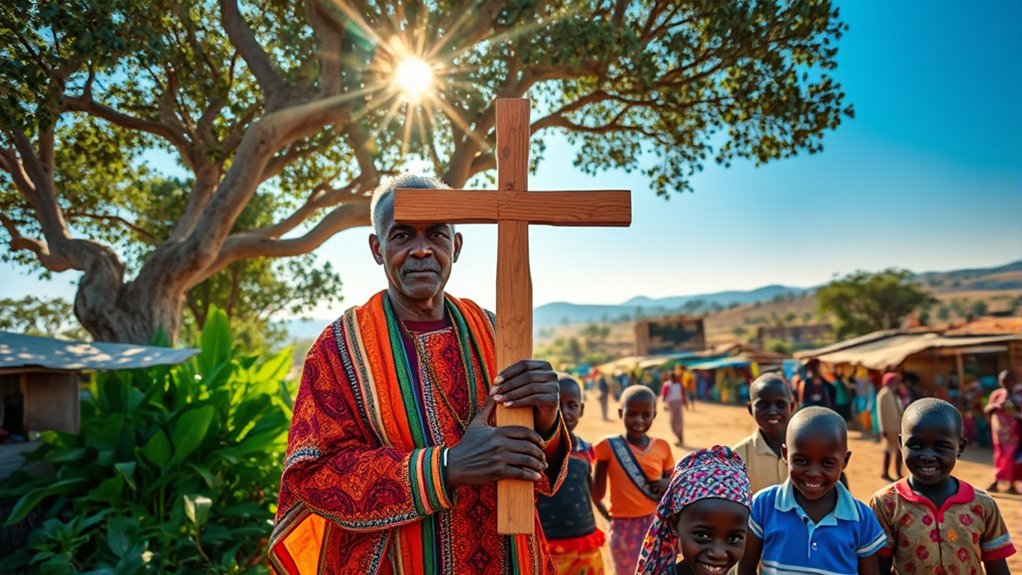Beginning on missionary adventures in Africa means embracing diverse cultures, traditions, and community customs. You’ll face challenges like tough terrains and language barriers, but you’ll build trust through patience, respect, and cultural understanding. Supporting sustainable projects in health, education, and eco-tourism helps communities thrive long-term. As you grow personally and deepen your faith, you’ll witness inspiring stories of transformation. If you stay engaged, you’ll discover how these experiences foster meaningful connections and lasting change.
Key Takeaways
- Building trust through cultural respect, traditional attire, and active participation in local festivals fosters meaningful missionary relationships.
- Overcoming challenging terrains and weather requires reliable transportation, local guides, and careful route planning.
- Supporting sustainable projects, education, and healthcare enhances community resilience and promotes long-term development.
- Engaging in interfaith dialogue and embracing humility deepen personal faith and cross-cultural understanding.
- Effective communication through local language, visual aids, and patience strengthens community engagement and project success.
Embracing Diverse Cultures and Traditions

When you step into a new community, you quickly realize that every culture and tradition holds its own unique meaning. You notice how traditional clothing reflects identity and history, often vibrant and full of symbolism. Participating in local festivals offers a glimpse into the community’s soul, showcasing dance, music, and rituals passed down through generations. These celebrations aren’t just events; they’re expressions of faith, heritage, and unity. By embracing these customs, you deepen your understanding and respect for the people’s way of life. Wearing traditional clothing or joining festivities helps bridge cultural gaps, fostering genuine connections. It’s a powerful way to honor their traditions while enriching your own perspective. Through these experiences, you truly become part of the community’s vibrant cultural tapestry.
Overcoming Challenges in Remote Areas

You’ll face tough terrain that tests your resilience and resourcefulness, making travel slow and difficult. Building trust with local communities is essential, but it requires patience and genuine respect. Overcoming these challenges is vital to making a lasting impact in remote areas.
Confronting rough terrain poses one of the greatest obstacles for missionaries working in remote areas. You’ll often find yourself crossing rugged trails, dense forests, or uneven paths that challenge your stamina and patience. These landscapes are essential for wildlife conservation and eco tourism, drawing visitors eager to see untouched nature. To succeed, you adapt by using sturdy vehicles, walking long distances, or relying on local guides who know the terrain intimately. You learn to anticipate weather changes and plan your routes carefully. Carrying essential supplies becomes indispensable, ensuring you stay safe and effective in your mission. Overcoming these physical challenges not only helps you reach communities but also supports the preservation of the environment, fostering sustainable eco tourism and wildlife conservation efforts in these remote regions.
Subheading 2: Building Local Trust
Building trust with local communities is essential for the success of your mission, especially in remote areas where outsiders are often viewed with suspicion. To overcome this, employ trust building strategies that emphasize genuine cross-cultural communication. Show respect for local customs, listen actively, and be patient as relationships develop. Remember, trust isn’t built overnight—it’s cultivated through consistency and sincerity. Use this table to guide your approach:
| Approach | Action | Outcome |
|---|---|---|
| Respect local customs | Learn and honor traditions | Builds credibility |
| Active listening | Engage with community stories | Fosters mutual understanding |
| Patience | Spend time without immediate goals | Deepens relationships |
| Transparency | Be honest about intentions | Reinforces trust |
Applying these strategies helps bridge cultural gaps and establish lasting bonds necessary for your mission’s success.
Building Sustainable Community Projects
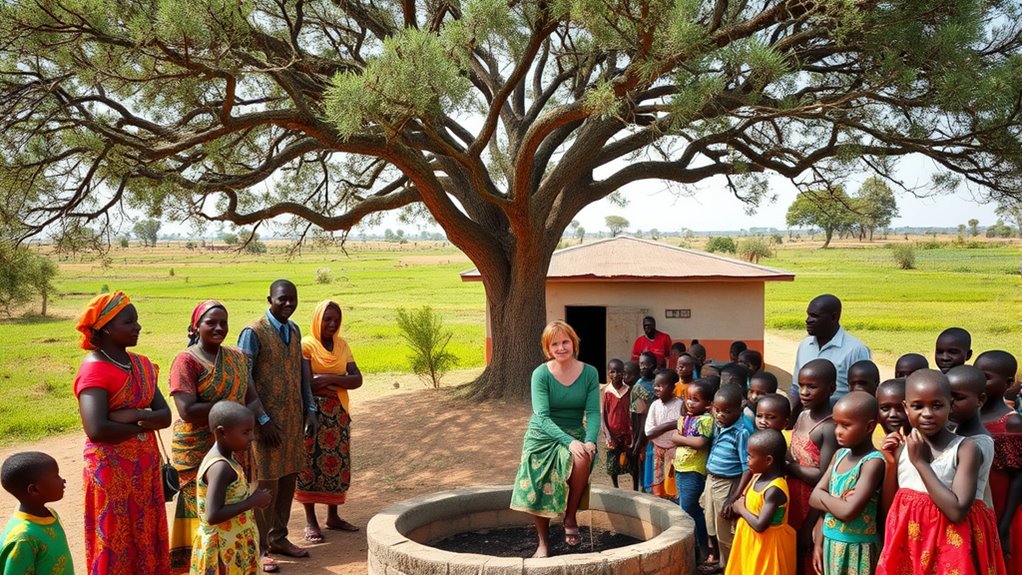
Creating sustainable community projects requires careful planning and genuine engagement with local residents. You can start by fostering cultural exchange, which helps build trust and understanding. When residents see your respect for their traditions, they’re more likely to work together. Focus on sustainable farming methods, teaching new techniques that improve crop yields without harming the environment. Involving the community in decision-making ensures projects meet their real needs, making them more likely to succeed long-term. Practical training sessions empower locals to maintain these efforts after you leave. Remember, authentic collaboration creates a sense of ownership, so residents feel motivated to keep projects alive. By prioritizing cultural exchange and sustainable farming, you lay a strong foundation for lasting community development.
The Role of Healthcare and Education Initiatives
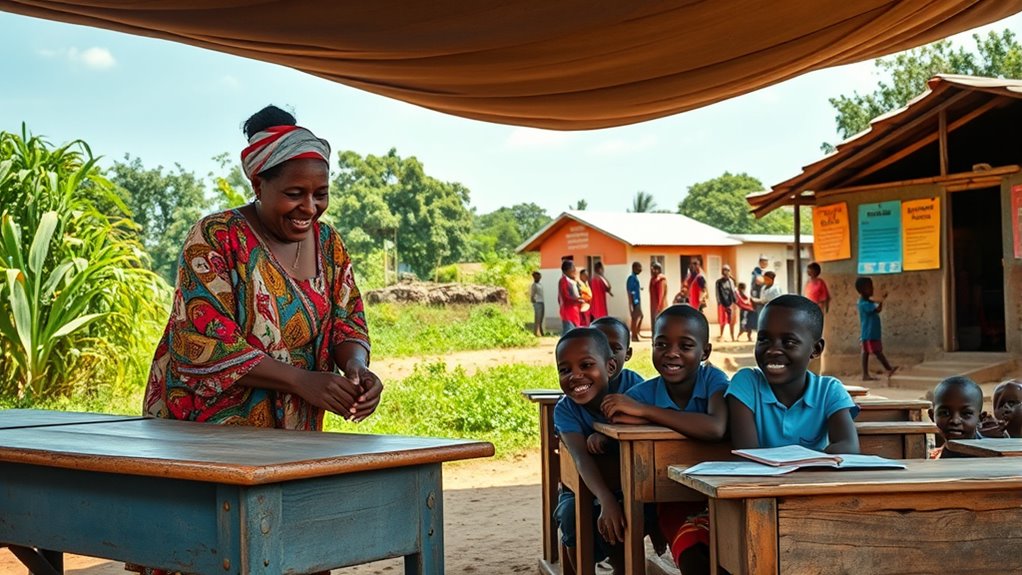
You can see how healthcare initiatives directly improve community health by providing essential services and medicines. Supporting local education helps empower individuals and creates lasting change. Together, these efforts strengthen communities and foster a brighter future.
Improving Community Health
How can healthcare and education initiatives transform community health in Africa? They play a crucial role by addressing key needs. Here are four ways:
- Providing access to clean water reduces waterborne diseases.
- Building sanitation facilities curbs the spread of infections.
- Educating communities about hygiene promotes healthier habits.
- Ensuring basic healthcare services catches illnesses early.
Supporting Local Education
Building a strong foundation in education goes hand in hand with improving community health. Your efforts can include developing effective fundraising strategies to support local schools and training programs. By securing funding, you guarantee access to quality materials, facilities, and teacher training. Volunteer recruitment plays an essential role; recruiting passionate individuals helps expand educational outreach and provides mentorship to students. You might organize local events or online campaigns to attract volunteers and donors. Empowering schools not only boosts literacy and skills but also fosters healthier communities by promoting awareness about health practices. When you focus on supporting local education, you create a cycle of growth—better education leads to healthier, more resilient communities, making your mission more impactful and sustainable.
Personal Growth and Faith Deepening

Have you ever wondered how facing unfamiliar challenges abroad can transform your faith and personal outlook? When you engage in interfaith dialogue and practice cultural adaptation, your perspectives deepen. Here’s how it happens:
- You develop empathy by understanding diverse beliefs and traditions.
- You strengthen your faith as you see its relevance in new contexts.
- You build resilience through traversing cross-cultural misunderstandings.
- You grow personally as you learn to listen more and judge less.
These experiences push you beyond comfort zones, fostering authentic connections and spiritual growth. Embracing cultural differences and engaging in interfaith dialogue challenge your assumptions, making your faith more vibrant and adaptable. Ultimately, your journey becomes one of continuous transformation, rooted in humility and open-mindedness.
Stories of Impact and Transformation
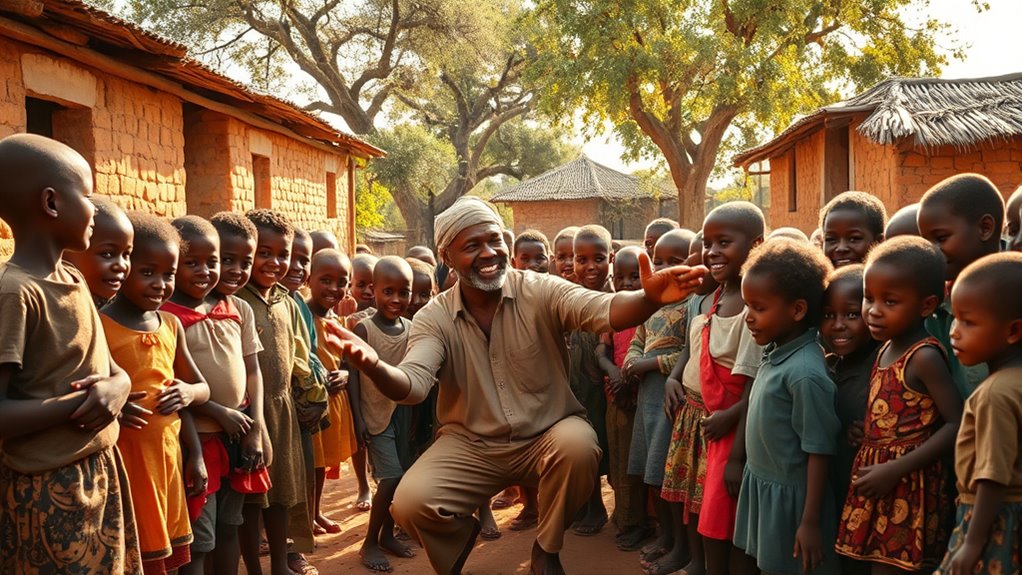
What stories of impact and transformation emerge when missionaries immerse themselves in African communities? You witness lives changing through initiatives like environmental conservation projects, where communities protect their natural resources. Technological innovation also plays a role, empowering locals with tools for sustainable farming, clean water access, and healthcare. These efforts foster hope and resilience, inspiring many to pursue better futures. Here’s a snapshot of these transformations:
| Community Impact | Personal Growth | Environmental & Tech Advances |
|---|---|---|
| Restored forests | New leadership skills | Solar-powered clinics |
| Clean water access | Increased confidence | Farming tech adoption |
| Education for children | Strengthened faith | Waste management programs |
| Empowered women | Community pride | Renewable energy projects |
Your presence helps spark these meaningful changes, creating lasting ripples of hope.
Navigating Language and Communication Barriers
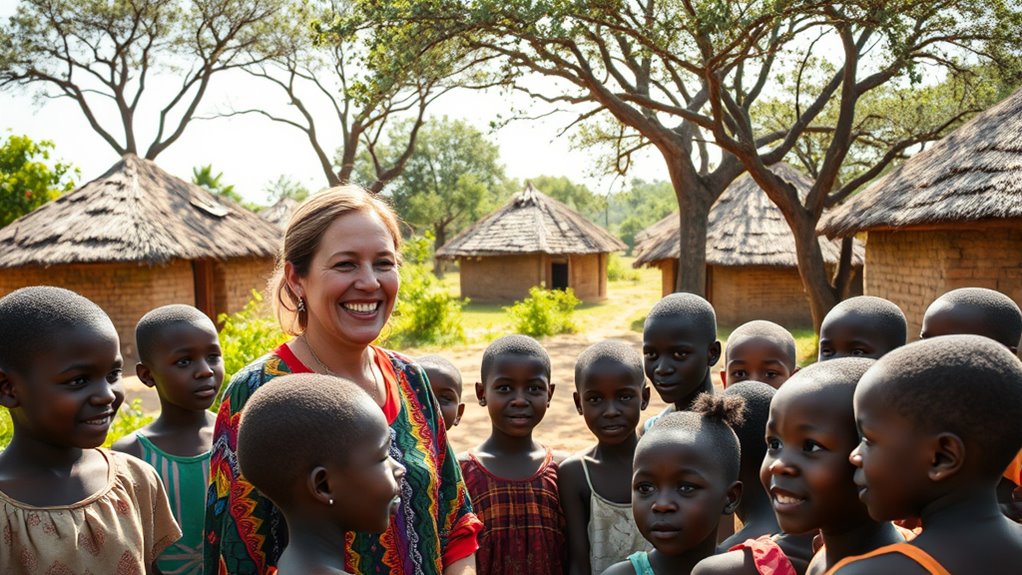
When stepping into African communities, missionaries often encounter language and communication barriers that can hinder connection and understanding. To overcome these translation challenges, you can:
- Learn basic local phrases to build trust quickly.
- Use visual aids and gestures to reinforce messages.
- Collaborate with local translators or bilingual community members.
- Practice patience and listen actively to ensure clarity.
These steps help bridge language barriers and foster genuine relationships. Remember, translation challenges aren’t just about words—they’re about understanding cultural nuances. Your willingness to adapt and learn shows respect and opens doors for deeper connection. Embracing these strategies makes your mission more effective, ensuring your message resonates beyond language differences. Patience and humility are your greatest tools on this journey.
Frequently Asked Questions
How Do Missionaries Fund Their Long-Term Projects in Africa?
You can fund long-term projects through effective fundraising strategies that focus on building strong donor engagement. By sharing compelling stories, demonstrating transparency, and showing the impact of your work, you inspire donors to contribute consistently. Hosting events, leveraging social media, and creating regular communication channels help sustain support. Remember, maintaining personal relationships with donors encourages ongoing generosity, ensuring your projects in Africa have the resources they need to succeed.
What Safety Precautions Are Taken During Remote Missions?
Imagine you’re steering a vast, uncharted jungle—your safety gear is your compass, guiding you through potential dangers. During remote missions, you take precautions like wearing appropriate safety gear and having clear emergency plans. These steps serve as your safeguard, ensuring you’re prepared for unexpected challenges. By staying vigilant and equipped, you protect yourself and those around you, transforming uncertainty into a journey of purpose and safety.
How Do Missionaries Adapt to Local Dietary Customs?
You adapt to local dietary customs by embracing the local food and respecting dietary restrictions. You learn from locals about traditional dishes and ingredients, adjusting your eating habits accordingly. You stay open-minded and flexible, trying new foods while being mindful of any cultural or health-related restrictions. This approach helps you build relationships and shows your respect for the community’s customs, making your experience more meaningful and respectful.
What Training Is Provided Before Missionaries Deploy?
Think of your deployment as stepping into a new world, where preparation is your compass. Before you go, you receive cultural orientation to navigate local customs smoothly and language immersion to speak with heart and clarity. This training arms you with essential knowledge, helping you connect authentically and serve effectively, turning unfamiliar terrain into a welcoming home. It’s your map for meaningful engagement and lasting relationships.
How Do Missionaries Handle Cultural Misunderstandings?
When facing cultural misunderstandings, you handle them with patience and cultural sensitivity. You actively listen, ask respectful questions, and seek to understand local customs to bridge language barriers. It’s important to remain humble and open-minded, acknowledging differences without judgment. By building relationships and showing genuine respect, you can navigate misunderstandings effectively, fostering trust and cooperation in your mission. This approach helps create meaningful connections despite cultural challenges.
Conclusion
Your journey through Africa’s vibrant tapestry of cultures is like uncovering a hidden treasure chest, filled with lessons of resilience and hope. As you navigate challenges and build lasting bonds, your faith and spirit grow stronger, blossoming like a resilient tree rooted in purpose. Every story of impact becomes a shining star in your constellation of memories. Keep shining your light, for your adventures are weaving a legacy that transforms lives and ignites the world’s soul.

